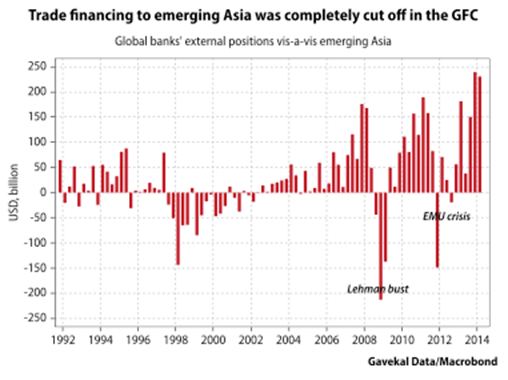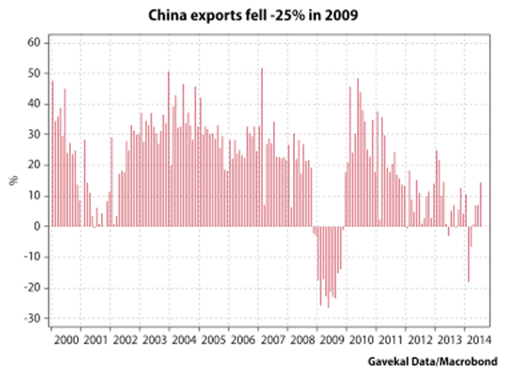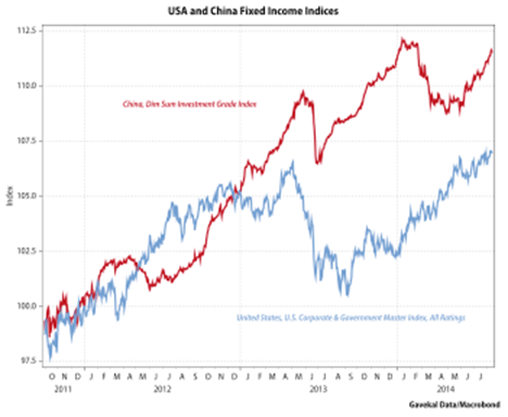For the last four years, I have been highlighting the idea that when Beijing floats the renminbi, the currency may go down, not up, which is the exact opposite of what those who accuse China of currency manipulation believe would happen. I had this very argument with Lindsey Graham two weeks ago at a small dinner in New York, where I listened politely to his positions on a variety of topics until he began talking about currency manipulation. Given that the preceding topic had been the Federal Reserve, and considering that the rest of the world considers the quantitative easing that the Fed did to be the epitome of currency manipulation, I found that I couldn’t sit still; and we engaged in a very, let’s call it intense, back and forth. To the Senator’s credit, and my surprise, after dinner he came over and asked if I would visit him in New York, which is now on my short list of things to do.
Worth Wray and I argued in our just-published book, A Great Leap Forward?, on all things China, that Beijing may ultimately be forced to devalue the RMB in order to regain its still-eroding export competitiveness (especially against Japanese firms) and, in turn, ship its deflation problem abroad. But in the spirit of our book and given that we try to explore different sides of arguments here in Outside the Box, I would like to share a brilliant excerpt from the book by our mutual friend Louis-Vincent Gave. Louis makes a compelling argument not only for why Beijing prefers a strong RMB going forward but also how the RMB can be instrumental in boosting demand for China’s exports as it moves up the value chain.
Like Louis, a number of our contributors to the book are optimistic about the potential for China to succeed. Others see little hope. What we have tried to do in the book is to give you a sense of all sides of the arguments on the key issues. For the optimists to be right we will see need to see certain events unfold in a reasonably timely fashion. If they don’t, it will be time to take a more pessimistic view. We tried to be even-handed and open-minded in our selection of authors and chapter topics. And while we have our own views, we encouraged everyone to present theirs as forcefully as possible.
I’m immensely proud of this book and believe it will become one of the definitive expositions on modern China. And it should be, considering the breadth and depth of the contributing authors, many of whose names you will recognize, while others may be unfamiliar. But I guarantee you, they are all leading experts on the topics they cover. Take a glance at our list of authors (in alphabetical order):
Andrew Batson, Ian Bremmer, Ernan Cui, Jason Daw, Ambrose Evans-Pritchard, Louis-Vincent Gave, David Goldman, Mark Hart, Neil Howe, Simon Hunt, George Magnus, Jawad Mian, Leland Miller, Raoul Pal, Michael Pettis, Sam Rines, Jack Rivkin, Nouriel Roubini, Gillem Tulloch, Logan Wright, and Wei Yao. Plus an introduction and editing by Worth Wray and your humble analyst.
The book is available only in e-book format (for now). You can get it on Amazon Kindle, iTunes Books, and Barnes & Noble Nook. If you want to know more about the book and the authors you can go to the link on my website.
I have now taken up residence in the area of New York City known as NoHo. It’s quite a lively neighborhood, very trendy, don’t you know. I really didn’t know quite what to expect, as we were looking at apartments all over the city, trying to find one that “fit.” But this works for me. Scores of restaurants and a Whole Foods Market within a few blocks, plus enough subway stops that I can get anywhere without too much trouble. I had lunch the other day with Barry Ritholtz.
For those who are near a TV on Friday afternoon, I will be appearing live on FOX Business with my new friend Trish Regan, sometime in the 2 PM Eastern hour.
I had to take a quick trip yesterday to Virginia Beach to see my friend Mark Finn. It was supposed to be hop on down, have a meeting, and jump back on a plane to NYC. Except that the plane was canceled and I had to spend the night and get up at 4 AM the next morning in order to catch the first flight and be on time for my meetings here. I expect to sleep well tonight. Mark was quite apologetic about the canceled flight, but I told him not to worry; this is not exactly the first flight that has been canceled on me. At least there was a nice hotel, and I was able to get booked on that flight out the next morning. Nowhere near the hassle of being canceled on in a foreign country, where you could be stuck for a day or more. Just one of life’s minor inconveniences. The joy of travel and all that.
I trust you are having a great week. I see a small party and dinner in my immediate future.
Your happy with his book reviews analyst,
John Mauldin, Editor
Outside the Boxsubscribers@mauldineconomics.com
The Importance of RMB Internationalization
By Louis-Vincent Gave
The Fed's QE policies of recent years have, for all intents and purposes told the world that “the dollar is our currency and your problem.”
And, in recent years, the dollar has been a genuine problem for a number of emerging countries. Indeed, if nothing else, the Lehman Brothers bust revealed the extent to which almost all of the trade (and project financing, and private bank lending, etc…) between emerging markets still takes place in dollars. This means that emerging market nations must either first earn dollars, or find someone to lend dollars to them, before expanding their trade and capital spending. It also means that, if US banks are mismanaged, emerging markets tend to fall apart as companies there can no longer obtain financing for trade, investment projects, etc...

This was the main lesson that most emerging market policymakers learnt in 2008. Until then, having 100% of one's trade denominated in dollars did not seem awkward. But once the Lehman bust showed to the world that American bankers were no smarter than anyone else's and worse, that American regulators were also no better than any other countries’, then financing every trade and every investment in dollars rapidly shifted from being the “easy thing to do” to a “problem that needed to be addressed”. All of a sudden, it became obvious that depending on the dollar made no sense if the US banking system was badly managed and badly regulated. The scales fell from the eyes of the emerging markets' policymakers. And chief amongst the countries looking to make a shift was China which, by 2008, had become the number one, or at worst number two trading partner for almost any emerging market, importing commodities from Latin America, Africa, the Middle-East, Russia or South East Asia and exporting manufactured goods everywhere around the world.
With Lehman and AIG hitting the skids, trade finance just dried up and China’s exports fell -25% YoY:

Now the fact that the US, or Europe, would import less as they entered into a recession was understandable enough. But really what stung most was that China’s emerging market trading partners also cancelled orders and, as a result, some 25mn migrant workers lost their jobs almost overnight.
Following this traumatic event, and the change in the perception of US stability, China went around the world and invited the likes of Brazil, Indonesia, South Africa, Turkey and Korea to shift some of their China trade away from the dollar and into renminbi. China started doing this in 2011 and, as we see it, the renminbi’s attempt to become a trading currency is potentially one of the most important financial developments. Yet no-one seems to care.
For the likes of Brazil, Turkey or South Africa to start trading in renminbi means that these countries' central banks will need to keep some of their reserves in renminbi. Which, in turn, means that China needs to offer assets for these central banks to buy. This simple reality has pushed China to create the offshore renminbi bond market in Hong Kong, the “dim-sum” bond market. China’s invitation to other countries to start trading more in renminbi also explains why, over the past two years, the PBoC has gone around the world and signed swap agreements with the central banks of Brazil, Korea, Turkey, Australia, Argentina and countless others. In essence, China has told her emerging market trading partners: “Let’s move our trade to renminbi and if you don’t have any, you can come borrow some on my HK dim sum bond market, or alternatively, we will just lend some to you directly through our central bank.”
Given the increasing risk that a US with a structurally improving trade balance (thanks to falling energy imports) will send ever fewer dollars abroad, China’s attempt to mitigate its dependency on the dollar could not be better timed. Of course, these efforts can only bear fruit if both the renminbi bond market and the renminbi exchange rate prove to be stable — in essence, if the renminbi is seen as offering a reasonable alternative to the dollar; if the renminbi manages to transform itself into the deutschemark of emerging markets.
Which brings us to the global bond market meltdown that followed the Fed’s announcement of a possible tapering of US treasury purchases — the Spring 2013 ‘taper tantrum’. Following Ben Bernanke’s May 2013 declarations, emerging and OECD government bond markets sold off aggressively to the point where, in the second quarter of 2013, renminbi bonds were the only bonds globally to offer investors positive returns! Like the hounds in Silver Blaze, the renminbi bond market has been the dog that did not bark; and just as Sherlock Holmes was quick to deduce an important message from the dogs’ silence, perhaps we should listen to the sound of the renminbi bond markets stability?

Indeed, in the face of weak Asian currencies, underwhelming Chinese economic data and disappointing global industrial and consumption numbers during 2013 (weak US ISM, weak EU retail sales, etc.) most would likely have expected Chinese bonds, or the renminbi, to fare poorly. Yet, renminbi bonds have been the new shelter-in-the-storm; a reality which draws two possible explanations:
- The offshore renminbi bond market, and the Chinese exchange rate, represent small, easily manipulated markets. And Beijing is manipulating them to suck in even more foreign capital into an economy that is increasingly spinning its wheels. Beijing will soon enough lose control and this will all end in tears (from our meetings, this would seem to be the consensus view — the pessimism on China is so deep that, if there was an Olympic medal for pessimism, most investors wouldn't even fancy China's chances).
- The offshore renminbi bond market, and exchange rate, represent small, easily manipulated markets. And Beijing is manipulating the markets in a clear bid to transform the renminbi into a trading currency.
We tend to favor the latter explanation, probably because, for China, successfully transforming the renminbi into a trading currency is more than just evolving towards settling its own imports in its own currency (as advantageous as that may be). Internationalizing the currency may well be the key to China’s future economic growth. Indeed, when thinking about China’s economic development, most of us intuitively think of all the “Made in China” goods stocking up the aisles of Walmart or Carrefour. And it is undeniably true that China’s prosperity has relied heavily on the export of cheap consumer goods to rich countries. China’s modern economy has mostly been export-led. This is unlikely to change overnight, even if ‘net trade’ has historically not been such a large contributor to GDP growth. Instead, exports have been central to China’s development model as the country’s insertion into the global supply chain has forced constant productivity gains. This cycle of improvement has been driven by technology and management know-how transfers, along with rapid shifts in the labor force. Thus, it is hard to imagine a strongly growing future for China without growing exports.
Which brings us to China’s current quandary: basically, over the past 30 years, China got rich by selling cotton underwear and plastic-soled shoes to the world. This is why most people carry an image of China as a phalanx of sweatshops, churning out T-shirts and toys for American and European shoppers. However, this image is now as outdated as skinny jeans. Instead, most of the growth in Chinese exports comes from industrial goods — and the customers are increasingly firms in developing countries building local infrastructure. China clearly no longer wants to pursue the high volume, highly polluting, low margin businesses which enabled it to rise from dire poverty. Instead, China (or at the very least, the Chinese Ministry of Commerce) now envisions its future as one of selling earth-moving equipment to Indonesia, telecom switches to India, cars to the Middle East, oil rigs to Russia and auto machinery to Eastern Europe or Latin America. The problem, of course, is that once one starts to compete with the likes of Caterpillar, Siemens, or Komatsu, having low prices may not be enough. Instead, offering attractive financing terms may be the deal clincher.
Please buy our latest book, A Great Leap Forward?, to keep reading Louis’ insightful chapter.
Like Outside the Box?
Sign up today and get each new issue delivered free to your inbox.
It's your opportunity to get the news John Mauldin thinks matters most to your finances.
Important Disclosures

